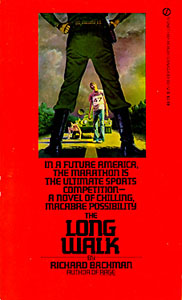
| The Long Walk |
|---|
 |
|
Publication Information
|
The Long Walk, Stephen King’s second novel published under the Richard Bachman name, represents a quantum leap forward in King’s writing. Published in 1979, after far more complex novels like The Shining and The Stand, The Long Walk was actually written when King was a teenager, shortly after finishing Rage. That a college student wrote such a book is startling; that it can stand with King’s later novels is astounding.
The premise is unsettling: one hundred boys, of their own volition, walking a marathon for the ultimate Prize. The Prize seems to be anything the winner wants for the rest of his life. I say “seems to be,” because the characters themselves seem less than clear on the subject; this vagueness only adds to the novel’s growing sense of futility. In between the start of the Long Walk and the Prize: death, and lots of it. Each Walker is afforded three Warnings; if you fall below four miles an hour, you are warned. If you interfere with another Walker’s progress, you are warned. You do not get a fourth warning; instead, you get shot to death.
We see all this through the eyes of Ray Garraty (number 47, which should have been a tip-off to Bachman readers; 1947 is the year King was born), who – against his better judgment – makes friends along the Walk. This inevitably makes it harder: it’s one thing to watch people you’re competing against being killed, it’s another to watch your friends being killed. Death lingers over every page of this book, along with the concept of The Crowd. The Crowd loves it when the Walkers win, but they love it even more when they lose. The Crowd loves blood. In some ways, this is an extrapolation of the end-scene from Rage, in which Charlie Decker's class rises up against Ted Jones. The concept of The Crowd again reflects King's ongoing interest in The Lord of the Flies, and the way in which groups will turn on individuals.
This exploration of popular culture’s obsession with competition and human suffering chillingly presages the current American interest in reality television, expanding on Ray Bradbury’s prescient explorations in Fahrenheit 451. Even the clichés are predicted here: the personality types aren’t any different than you’d see on an episode of America’s Next Top Model, the grueling challenges (walking through rain, sleeping without slowing down) not much worse than those on Survivor, and the admonition that “I’m not here to make friends, I’m here to win” has been a reality television staple for years. King would later revisit these themes in The Running Man, to someone less-satisfying results. Where The Long Walk is a character piece set inside a science-fiction/thriller construct, The Running Man is a somewhat socially-conscious action movie. King is more in his element here.
The Long Walk’s premise seems less far-fetched today than it did in 1979, and as such stands as one of King’s more terrifying novels. The Bachman books are generally bleaker than the ones King publishes under his own name – the Bachman standards of isolation, unsympathetic characters, and downbeat endings set them apart from King’s general optimism – and The Long Walk may be the bleakest Bachman novel. It’s also compulsively entertaining, drawing readers into the Walkers’ plights so inexorably that they become part of The Crowd. It’s almost a metatextual conundrum – criticizing a world that would be fascinated by such a competition while constructing a narrative so compelling that it is irresistible. The novel, cleverly, only works because King is at odds with his own argument.
In the larger context of King’s canon, it also works because it offers an intriguing look at King’s evolution as a writer. The Long Walk is an important stepping-stone in King’s early progress, a necessary bridge between Rage and Carrie. Like Rage, The Long Walk features a large cast of teenagers in a lunatic situation. However, while Rage’s Freudian excesses can be forgiven for their having been written when King was very young, The Long Walk doesn’t need such easy outs. It is a work of startling maturity; in terms of characterization, pacing, and mood, The Long Walk is the first accurate blueprint of King’s adult work.